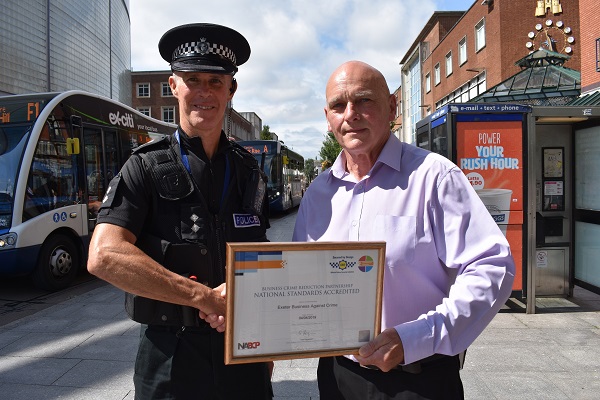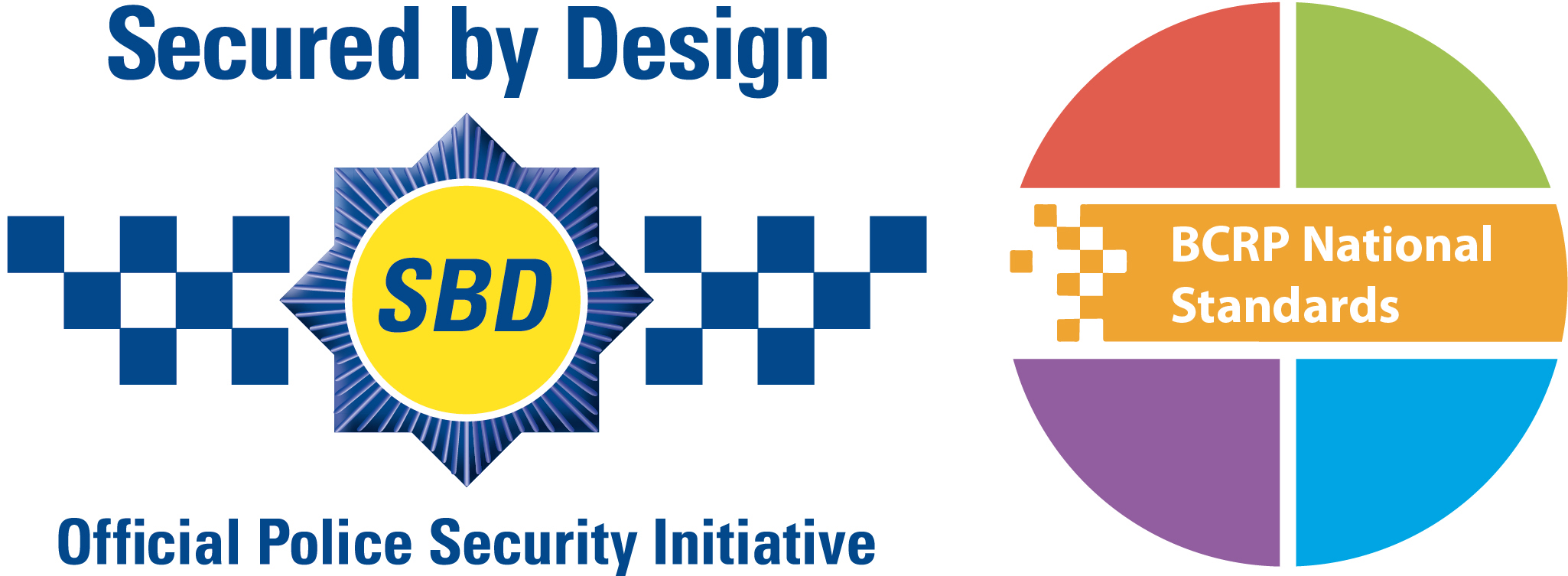Exeter Business Against Crime: ‘exceeding requirements’ in 48 out of 56 standards
Exeter Business Against Crime (EBAC) has been redoubling its efforts to support its business members in the fight against crime and anti-social behaviour as the retail and hospitality sectors start to get back on their feet after all the COVID lockdowns and restrictions.
EBAC’s Coordinator, Gary Clifton, has been out and about visiting members regularly to encourage them to report crime and suspicious behaviour using their EBAC radios and the non-emergency 101 police number as well as make the best use of the DISC offender alert system.
For example in April, Gary visited 14 members in one particular area of Exeter City Centre following concerns about anti-social behaviour having analysed member data. He spoke to them about the need to report incidents so police have accurate and up-to-date information to enable them to provide an effective response.
This initiative led to police agreeing to prioritise the area and adopt a zero-tolerance approach towards offenders. “We are already seeing an increase in reports submitted and police attendance to issues in this area,” explained Gary. EBAC has been instrumental in obtaining numerous Criminal Behaviour Orders and sentences for offenders.
Members are also being urged to take part in other aspects of EBAC’s ‘best practice’ programme, including encouraging them to ask for free training, such as ‘deter and disrupt’, at their premises.
Members are always invited to comment on EBAC’s activities and performance, which leads to regular updates on EBAC’s ‘action plan’ for scheme improvement.
It is initiatives like these that have led to EBAC being successful in renewing its National Standards Accreditation with Police Crime Prevention initiatives (Police CPI), a police-owned organisation that works alongside police forces to reduce crime and build safer communities.
In the five assessment categories, which include aims and objectives, partnership working communications, procedures and governance, EBAC ‘exceeded’ requirements in 48 out of the total of 56 standards – and judged as ‘meeting’ requirements in the remaining eight standards. In one category – communications – it exceeded all standards.

Gary (pictured above with Police Inspector Simon Arliss) commented: “I’m sure there are many BCRP managers who know only too well what a difficult role this is, particularly if you work alone. I often ask myself: Have I done the right thing? Is that document correct? Do I understand GDPR? along with many other questions.
“It’s extremely pleasing, following the assessment, to be able to think that it seems I am doing OK and EBAC is in good order.
“Above all else, it’s important for our members and our partners to have confidence that the scheme is being managed in a competent manner and achieving and exceeding the National Standards,” he said.
A self-funding, autonomous organisation, EBAC’s management and steering groups comprise managers from the two main city shopping centres and other retailers, a representative from the night-time economy, a Police Inspector, BID Manager and two city council employees – the CCTV control and licensing managers.
With finances regularly scrutinised by Exeter City Council, EBAC’s fees have remained unchanged for four years and surplus funds are earmarked for replacement of radios, which are owned by EBAC.
The BCRP assessment was carried out by Andrew Sharman, of the National Association of Business Crime Partnerships. In his summary, Andrew said EBAC continues to be a well-established Business Crime Reduction Partnership (BCRP) which has weathered the business challenges caused by COVID lockdowns and restrictions.
Andrew commented that EBAC is a robust scheme and is well-placed to develop as businesses and High Streets welcome back customers. “It has good partnerships with traders, police and council. I am satisfied that they exceed the National Standards.”
Guy Collyer, who leads on BCRPs for Police CPI, said: “Exeter Business Against Crime is a highly pro-active outfit that works in close partnership with organisations, including the police, to make the city centre a safe place for people to live, work and visit. The way it has largely swept the board for exceeding standards underlines how well-embedded this Business Crime Reduction Partnership is within its local community. It’s an outstanding achievement.”

The BCRP National Standards Award is based on a set of standards owned by the National Business Crime Centre and includes good management practices and procedures to ensure BCRPs are functioning in an ethical and professional manner within the law.
The assessment includes membership agreements, data security and compliance with current legislation, specifically General Data Protection Regulation. It involves demonstrating that information received by members and partner organisations is robust, up to date and easily accessible 24/7. For some BCRPs, the standards will include the use of CCTV and radio links with members.
It is expected that the National Standards will enhance the level of partnership working around the country and encourage continued, significant, national business investment in BCRPs. In addition, the intention is that it will provide reassurance to police forces that data shared with BCRP partner organisations will be utilised in a responsible manner to reduce criminal activity.
About Police Crime Prevention Initiatives (Police CPI)
Police CPI is a police-owned organisation that works on behalf of the Police Service throughout the UK to deliver a wide range of crime prevention and demand reduction services. It maintains close working links with the Home Office, National Police Chiefs’ Council (NPCC) and police forces around the country. Senior police officers are Police CPI Board Members and control and direct the work Police CPI carries out.
Visit: www.policecpi.com